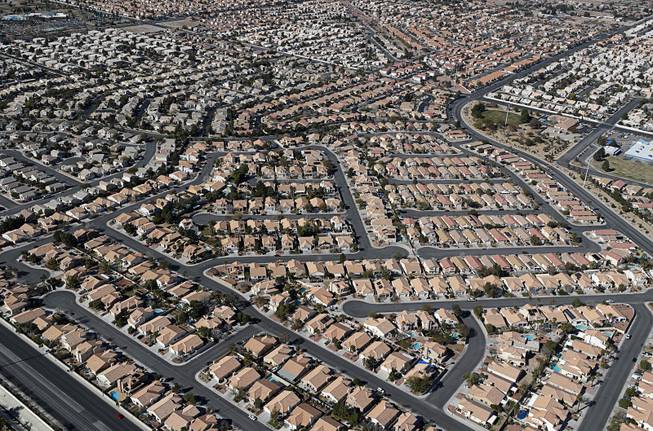
A residential neighborhood is shown in the northwest Las Vegas Valley Thursday, Feb. 7, 2018.
Thursday, Feb. 27, 2020 | 2 a.m.
The Las Vegas economy is much stronger than it was 10 years ago, but the city still lacks a sense of community, according to many residents. That elusive quality was cited most frequently by residents as something missing from their neighborhood in a survey conducted last year on behalf of Las Vegas officials.
Distributed to 1,712 residents, including at least 210 people from each of the city’s six wards, the survey included questions about quality of life, trust in city services and hopes for the future, among other topics. The responses will inform the Las Vegas 2050 master plan, which will provide a framework for economic development, zoning, transportation, housing, public safety and other local issues in Las Vegas over the next 30 years, said Marco Velotta, planner for the city.
“We see the plan itself as a policy document, and the guide that ultimately lays out goals in all the required areas and statutes that we’ll be able to incrementally get to over time,” Velotta said.
Jeremy Aguero, principal analyst at the Nevada-based economic consulting group Applied Analysis, presented the results of the master plan survey at a special Las Vegas City Council meeting Wednesday. The city’s economic recovery following the Great Recession and its current unemployment rate of less than 4% was not lost on respondents, 76% of whom said they were extremely satisfied or somewhat satisfied with quality of life in Las Vegas, Aguero said.
“There is a general satisfaction with what is being provided by the city. There is a general conversation about progress,” he said.
Crime was cited as the No. 1 reason why respondents might not recommend moving to the city, Aguero said. Thirty percent of respondents said they did not feel safe in their neighborhood parks. Respondents across wards, however, tended to perceive their own neighborhood as safer than the city as a whole.
“(Crime) is something residents think is extremely important, and also a risk to their communities,” Aguero said.
When asked to rank the quality of services in the city, respondents rated parks and recreational amenities most favorably. Education was ranked the lowest, with only 29% of respondents saying they thought educational opportunities here were “good” or “excellent.”
K-12 education in Las Vegas is run by the Clark County School District, which is independent from the city. The fifth-largest district in the United States, CCSD also has some of the largest class sizes in the country.
“The concern we get as much as any deals with education and the quality of education, particularly among families that have children,” Aguero said.
Since the master plan aims to shape upcoming policy and growth, respondents were asked about their hopes for Las Vegas’ future. They indicated that improving health care here should be a priority, in addition to addressing education, homelessness and public safety. Some respondents expressed hope that Las Vegas could become the “safest city in the country,” Aguero said.
While respondents said they associate the city’s rapid growth with progress, they also raised concerns about challenges that could come with it, such as infrastructure issues and overcrowding in schools. Another 250,000 people are projected to live in Las Vegas by 2050, while the region as a whole could gain another 1 million people by that year, Velotta said. In anticipation of that growth, unincorporated Clark County, which is not required to develop a master plan the way that Nevada cities are, hopes to expands its development boundaries significantly through a proposed public lands bill.
“The community is going to have to continue to justify why it’s growing, how it’s growing and that it’s growing in a way that doesn’t diminish the quality of life for residents that are here already,” Aguero said of Las Vegas’ growth.
As for respondents’ desire for a greater sense of community, the sentiment might not be entirely negative, Aguero said.
“I think they want more of a sense of community because they love the community they have chosen,” he said.
The city hopes to have a master plan draft ready by early April. The plan will need to be approved by the planning commission and the city council, which will likely happen in June, Velotta said.
